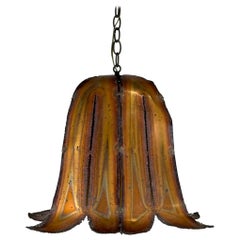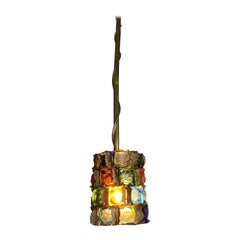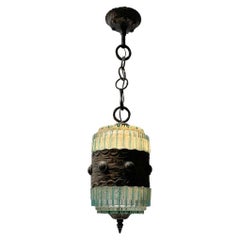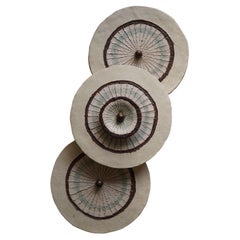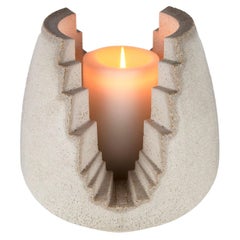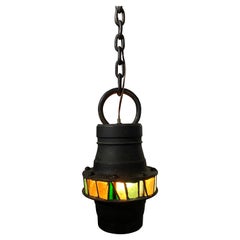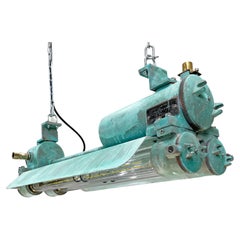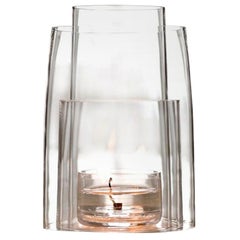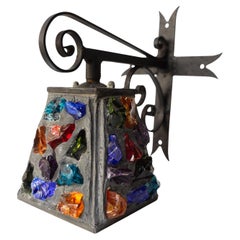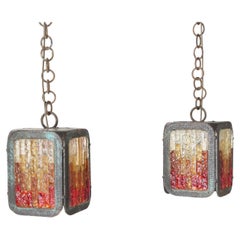Brutalist Lanterns
The design of brutalist furniture encompasses that which is crafted, hewn and worked by hand — an aesthetic rebuke (or, at least, a counterpoint) to furniture that is created using 21st-century materials and technology. Lately, the word “brutalist” has been adopted by the realms of furniture design and the decorative arts to refer to chairs, cabinets, tables and accessory pieces such as mirror frames and lighting that are made of rougher, deeply textured metals and other materials that are the visual and palpable antithesis of the sleek, smooth and suave.
ORIGINS OF BRUTALIST FURNITURE DESIGN
- Brutalism emerged during the mid-20th century
- Term coined by architecture critic Reyner Banham
- Originated in the United Kingdom
- Brutalist architecture gained popularity in the United States beginning in the early 1960s
- Inaugural brutalist projects include Unité d'habitation and the city of Chandigarh, India, both of which owe to influential architect Charles-Édouard “Le Corbusier” Jeanneret
- Le Corbusier’s cousin, Pierre Jeanneret, designed hundreds of chairs, tables, cabinets and lamps for Chandigarh
- Informed by the Bauhaus, constructivism, modernism and the International Style; part of mid-century modernism
- Contrasted starkly with Beaux Arts style
CHARACTERISTICS OF BRUTALIST FURNITURE DESIGN
- Use of industrial materials — tubular steel, concrete, glass, granite
- Prioritizes functionalism, minimalism and utilization of negative space
- Spare silhouettes, pronounced geometric shapes
- Stripped-down, natural look; rugged textures, modular construction
- Interiors featuring airy visual flow and reliance on neutral palettes
BRUTALIST FURNITURE DESIGNERS TO KNOW
VINTAGE BRUTALIST FURNITURE ON 1STDIBS
The term brutalism — which derives from the French word brut, meaning “raw” — was coined by architecture critic Reyner Banham to describe an architectural style that emerged in the 1950s featuring monumental buildings, usually made of unornamented concrete, whose design was meant to project an air of strength and solidity.
Le Corbusier essentially created the brutalist style; its best-known iterations in the United States are the Whitney Museum of American Art, which was designed by Marcel Breuer, and Paul Rudolph's Yale Art and Architecture Building. The severe style might have been the most criticized architectural movement of the 20th century, even if it was an honest attempt to celebrate the beauty of raw material. But while the brutalist government buildings in Washington, D.C., seemingly bask in their un-beauty, brutalist interior design and decor is much more lyrical, at times taking on a whimsical, romantic quality that its exterior counterparts lack.
Paul Evans is Exhibit A for brutalist furniture design. His Sculpture Front cabinets laced with high-relief patinated steel mounts have become collector's items nonpareil, while the chairs, coffee table and dining table in his later Cityscape series and Sculpted Bronze series for Directional Furniture are perhaps the most expressive, attention-grabbing pieces in American modern design. Other exemplary brutalist designers are Silas Seandel, the idiosyncratic New York furniture designer and sculptor whose works in metal — in particular his tables — have a kind of brawny lyricism, and Curtis Jere, a nom-de-trade for the California team of Curtis Freiler and Jerry Fels, the bold makers of expressive scorched and sheared copper and brass mirror frames and wall-mounted sculptures.
Brutalist furniture and sculptures remain popular with interior designers and can lend unique, eccentric, human notes to an art and design collection in any home.
Find authentic vintage brutalist chairs, coffee tables, decorative objects and other furniture on 1stDibs.
Late 20th Century American Brutalist Lanterns
Brass, Copper, Steel
Mid-20th Century South American Brutalist Lanterns
Brass, Metal
1970s Italian Vintage Brutalist Lanterns
Bronze
Late 20th Century Danish Brutalist Lanterns
Ceramic, Stoneware
2010s American Brutalist Lanterns
Concrete
1960s American Vintage Brutalist Lanterns
Iron
20th Century Unknown Brutalist Lanterns
Brass
2010s American Brutalist Lanterns
Concrete
Mid-20th Century American Brutalist Lanterns
Resin, Acrylic, Plastic
Late 20th Century Korean Brutalist Lanterns
Aluminum, Brass, Copper, Iron
2010s American Brutalist Lanterns
Crystal
20th Century Moroccan Brutalist Lanterns
Metal
Mid-20th Century German Brutalist Lanterns
Brass
20th Century Spanish Brutalist Lanterns
Rattan, Rope, Jute
Late 19th Century English Antique Brutalist Lanterns
Bronze
20th Century French Brutalist Lanterns
Copper
1930s Belgian Vintage Brutalist Lanterns
Metal
Early 20th Century European Brutalist Lanterns
Brass, Bronze
Late 20th Century Moroccan Brutalist Lanterns
Metal
Early 20th Century European Brutalist Lanterns
Brass, Bronze
1960s Danish Vintage Brutalist Lanterns
Metal
20th Century English Brutalist Lanterns
Wrought Iron, Lead
1970s Italian Vintage Brutalist Lanterns
Bronze, Steel
Late 20th Century Danish Brutalist Lanterns
Stoneware, Ceramic
2010s American Brutalist Lanterns
Concrete
1960s Swedish Vintage Brutalist Lanterns
Wrought Iron
1970s German Vintage Brutalist Lanterns
Copper
1970s Italian Vintage Brutalist Lanterns
Copper, Steel
20th Century American Brutalist Lanterns
Brass
Mid-20th Century European Brutalist Lanterns
Iron
Mid-20th Century Italian Brutalist Lanterns
Aluminum, Stainless Steel
Late 20th Century European Brutalist Lanterns
Bronze
